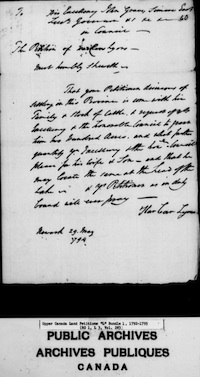 |
| Petition of Harcor Lyons Loyalist Source Upper Canada Land Petitions |
What is a Loyalist?
A Loyalist is any person who is loyal to their allegiance (especially in times of revolt). During the American Revolution in what was to become the United States of America, a Loyalist (also called UEL - United Empire Loyalist) was anyone who remained loyal to the King of England. They were called Tories in their own country but Loyalists elsewhere. Most fled to Canada and helped settle that country, particularly Ontario and Nova ScotiaOne of the best genealogy resources to find Loyalist ancestors in Ontario are the Upper Canada Land Petitions. Find out how the OIC (Orders in Council) for Loyalists can help you in your search
Tips for Finding a Loyalist Ancestor
1.Check the index to Upper Canada Land Petitions (UCLP) The land petitions often contain invaluable genealogical information including children's or father's names, spouse's names, places of origin, reports of the hardships they endured as Loyalists, Loyalist unit served in, and sometimes ages. The UCLP is available online as a searchable databaseFor help finding the actual certificates and petitions in the online films, see Searching Ontario Canada Land Records, eh? and Understanding Notations on the Envelope of an Upper Canada Land Petition
2. Check Land Books 1793-1826
For Upper Canada Land Books see Finding an Ancestor in the Challenging Upper Canada Land Books This is a step by step tutorial showing researchers how to use the index entries and details to find the Land Book entry online.
3. Check Loyalist Claims and Conversion List [NA MG14] 1790-1837 - Audit Office 12 and 13 compensation cliams for land and goods lost during the American Revolution - 178 reels of microfilm. Not all Loyalists filed claims. Many did and if your ancestor is among those who did, you won't want to overlook this.
4. Search the Heir & Devisee Commission records.
5. Search the Upper Canada Sundries. For help see 12 Months of Finding Ancestors: Upper Canada Sundries (Part 3 of a 12 Part Series)
6. Check Reid, W.D. Loyalists in Ontario: The Sons and Daughters of the American Loyalists of Upper Canada
7. Check the The Old United Empire Loyalists List
8. Check District Loyalist Rolls - transcript on MS803 at the Ontario Archives. Update: Brenda Dougall Merriman informs me that these were published: District Loyalist Rolls transcribed by Keith Fitzgerald (AO, MS 803)were published as his *Ontario People: 1796-1803* by the Ontario Genealogical Society. Brenda did a series on Loyalists and wrote the book called UEL: Finding Your Loyalist Ancestors in Upper Canada.
9. Check United Empire Loyalist Lists [NA RG 1, L7 vol 52a] on C-2222 from the Ontario Archives but be aware that no one list is complete! There were several versions of the lists drawn up and not finding an ancestor's name does not mean he was not a Loyalist.
10. An often overlooked source of information is The Haldimand Papers - papers and correspondence of Haldimand, Sir Frederick from 1758-1784. Available as 115 reels of microfilm from the NAC or as selected records on 50 reels of microfilm from the Ontario Archives. Muster rolls can be found on the H.P. in the National Archives of Canada as MG 21 These Loyalist volumes, and the nominal index to them, are available on microfilm reel C-1475. Avaiable on ILL (InterLibraryLoan)

No. 8: District Loyalist Rolls transcribed by Keith Fitzgerald (AO, MS 803)were published as his *Ontario People: 1796-1803* by the Ontario Genealogical Society.
ReplyDeleteDon't forget that most of the Loyalists went to New Brunswick and Nova Scotia.
ReplyDeletePaul Bunnell has written several books listing the Loyalists and where they went and some have spouses and children and where they were from.
Djot
Hi Djot - I don't know about your use of the word "most" when talking about how many Loyalists went to NB and NS
ReplyDeleteI don't have statistics for the numbers but I do know that different lists/sources give different numbers.
In any case I do not research NB or NS Loyalists so am not qualified to write advising how best to research them in that locale. This post was specifically about Ontario Loyalists.
Lorine,
ReplyDeleteAs usual and excellent post full of useful information. The Centerary book is also available on The Internet Archive Here.
Regards,
Bruce Gordon
P.s. Sorry if this a duplicate post but it was unclear when signing in with my Google account at the end of the post actually worked.
This information is very helpful for tracing Loyalist ancestors who went to Canada. May I suggest a future article describing sources for tracing Loyalist ancestors who went to Spanish Florida?
ReplyDeleteCGG
Hi Carole - great suggestion but unfortunately I am not familiar with Loyalist research in Florida.
ReplyDeleteMy area of knowledge is Loyalists to Ontario.
Hi Djot--
ReplyDeleteFrom the book "The Civil War of 1812" by Alan Taylor, he outlines the numbers of Loyalists leaving the States.
He says, "Blocked from returning home, at least 38,000 Loyalists settled in Britain's remaining northern colonies during 1783-84. The great majority(30,000)moved to the maritime provinces of New Brunswick and Nova Scotia. Smaller numbers settled in Quebec(2,000) and the upper country(6,000) west of Montreal as far as Detroit."
However, he later describes the "Late Loyalists" who moved from the States to Upper Canada from roughly 1791, "Through 1811, the American influx persisted at the rate of about five hundred families(or 2,500 persons) annually." And, "Thanks to newcomers, Upper Canada's population swelled from 14,000 in 1791 to 75,000 in 1812. By then, the Late Loyalists comprised three-fifths of the inhabitants, outnumbering both the original, true Loyalists, who had arrived during the 1780's."
I recommend reading this highly informative book, authored by Pulitzer Prize winner Alan Taylor, who teaches American and Canadian History at the University of California.
PS Not sure if I sent this twice.